gress. This condition continued for ten years, when, in 1833, the State was divided into nineteen districts, and as many Representatives served in the Twenty-third Congress. Beyond this the districts were not increased until 1843, when a new arrangement added two more to the number, and this continued until 1863, when the addition was stricken out and so remained until 1873, when twenty was fixed as the Ohio ratio. The last re-distriction was made in 1883, since when twenty-one members represent the State of Ohio in Congress.
As early as 1831, applications were made to the Legislature for railroad charters, and, on the 5th of June, 1832, the first charter, that of the "Cincinnati, Sandusky and Cleveland Railroad," was granted. On the 9th of March, 1855, a charter was granted for the "Sandusky, Mansfield and Newark Railroad." On the 11th of March, 1836, one for the "Little Miami" and three days later one for the "Cleveland, Columbus and Cincinnati Railroads." The Little Miami. Railroad was surveyed in 1837, and work commenced on it in 184o. Work was begun on the others about the same time, but not for several years afterwards were any of them, beyond a few miles, in operation.
The conduct of the United States bank officers had succeeded .in greatly exasperating those of the various State banks, not only in Ohio, but in all the other States, and in December, 1832, President Jackson recommended Congress to authorize the removal of the Government money from the United States bank, and to sell such stock of the bank as was owned by the Government. This Congress refused to do, and when the session ended, the President, who had nursed this refusal as a private grievance, took the responsibility of ordering the Secretary of the Treasury, Mr. Duane, to withdraw the public funds from the United States bank and deposit them, about ten million dollars, with certain State banks. The Secretary refused, and the President at once removed him from office, and put in his place Roger B. Taney, then the Attorney General, and subsequently Chief Justice of the United States Supreme Court. He obeyed the order of the President. Beginning in October, 1833, in the course of nine months the whole amount was removed. During those months the operation produced great public excitement and much commercial distress. When it began, the United States bank had outstanding loans of over $60,000,000, and so entangled was the business of the bank with that of the whole country that by the calling in of this money to fulfill the demands of the Government,

MEMORIAL HALL
IRONTON, O.
- 100 -
it paralyzed the business of the country. Strange to say, instead of having any intelligent idea of this fact as a mater of cause and effect, General Jackson saw in it proof positive that the bank was a dangerous institution and refused in the most obstinate manner to listen favorably to any petition for the modification of the measure he had instituted, or for relief on the application of merchants and manufacturers who waited upon him. His only reply was, in substance, that the government had no power to apply any remedy, or give relief. The banks had occasioned all the evils which existed, and those who had traded on borrowed capital ought to have become bankrupt. They had no one to blame but themselves.
But the relief denied by the President directly, was, through his operation, furnished indirectly, yet without his consent and, for some time without his knowledge. The condition was not made that the money, which was placed in the State banks, should be kept idle, and the banks, finding themselves loaded with millions, used these millions in a business way, and loaned freely to those offering ample security. In this manner, the very abject that President Jackson labored to frustrate was brought about more effectively than if he had not taken any action pertaining to it. Through the freedom with which the favored banks loaned the public money, speculation was stimulated, the credit system expanded beyond precedent, trade, for a short time paralyzed, recovered and even exceeded its previous energy, prices went up, luxuries abounded, and, as was the condition thirty years afterwards, nobody seemed to perceive the undercurrent of extravagance that was wasting the foundations of the Nation's real prosperity, putting them in condition to collapse and crumble before the first pressure of the storm that shortly after broke out with fury. The Bank of England began contracting its loans in the spring of 1836, and in July of that year the United States Treasury Department issued what was known as the "Specie Circular," directing all collectors of the public revenue to receive nothing 'but coin. American houses in London became bank-

CITY WATERWORKS
TOLEDO, O.
rupt with millions of liabilities, and, in 1837, every bank in the United States suspended specie payment. The United States bank, which, when the countenance of the Government had been removed from it, had been chartered by the State of Pennsylvania, in the hope of becoming one of those to which part of the Government money would be removed, but which was by the President denied, fell into hopeless ruin, and carried down with it the credit of the State of Pennsylvania, and the fortunes of thousands of her citizens, and others who held her bonds.
Up to the very last hour of his administration President Jackson persisted in the polrcy of his "Specie Circular," offensive though it was generally regarded, and as the very last act of his term of office, vetoed a bill passed by both Houses for its repeal, and to prevent its
- 101 -
passage over his veto, held it over the adjournment, and then dated his message, returning it with his veto, "March 3, 1837, a quarter before 12 p.m."
Van Buren, President Jackson's successor, was elected by a large majority, and, having organized a Cabinet that gave great satisfaction, called an extraordinary session of Congress, to meet on the 4th of September, 1837. In his message he proposed the establishment of a Treasury of the Government, independent of all banks and bankers. This proposition was vigorously opposed throughout the entire session of forty-three days, and, as a compromise of the terms of the "Specie Circular," an issue of $10,000,000 in Treasury notes was authorized. Not until 1840 did the subject of an independent treasury, faithfully adhered to by President Van Buren, meet with such favor that a law authorizing the organization of subtreasuries in the then three principal cities of the United States was enacted, and the revenue of the Government thereupon removed to them.
The peaceful relations between the United States and England which had existed for many years were in 1837 and 1838 disturbed by events connected with a revolutionary movement that broke out in Canada, the avowed object being to achieve the independence of those provinces. In this effort the people of the border States sympathized and gave the insurgents all possible aid. Individuals and organized companies went across the border and joined the insurgents, while refugees from the action of the law in C anada were received and protected by the border State people. The agitation and the outbreak occurred simultaneously in Upper. and Lower Canada, then so called, but there being little homogenity of feeling between the peoples of the two provinces, the scheme of revolution was ineffective. The active sympathy of the people of the border States irritated England, and President Van Buren, having issued a proclamation, warning Americans not to violate neutrality and international laws, sent a General to the Northern frontier to preserve order. The revolution, however, progressed until 1838. In the upper province, the insurrectionists, led by a man named William McKenzie, found themselves supported by, among others, a regiment of volunteers from Ohio, of which Lucius V. Bierce, of Akron, was elected Colonel. This regiment had a severe engagement with the Canada militia, but it fought its way through Windsor and finally escaped to Detroit.
In December, 1839, William Henry Harrison, of Hamilton County, Ohio, had been nominated by the National Whig Convention, held at Harrisburg, Pennsylvania, for the highest office in the United States, and in the year following he was elected to the Presidency, after a most strenuous and exciting campaign. Ohio had given her first President to the Union, to be followed by many others.
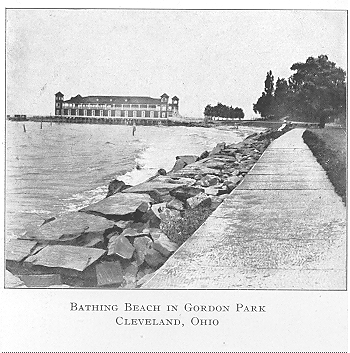
BATHING BEACH IN GORDON PARK
CLEVELAND, OHIO
- 102 -
CHAPTER VI
Trying Times of Civil War
Before the War of the Rebellion.—Anti-Slavery and Pro-Slavery Sentiments.—Loyal to the Union.—Patriotism of Ohio after President Lincoln's Call to Arms.—Participation of Ohio in the War.—Siege of Cincinnati.—Morgan's Raid through Ohio.—End of the Civil War.
FIFTY YEARS had now elapsed since the settlement of Ohio had begun in earnest. The State had been successful in opening hundreds of miles of canals between the waters of her northern and southern boundaries, and by the operation of Which the products of her soil had been doubled in the price they had previously commanded. Several railroads had been chartered, and were in course of construction, and now, one of her sons, who had conquered the enemies of her peace, had been elected the Nation's Chief Magistrate ! But the chair of the President of the United States was again soon to be vacated. Although General Harrison, when elected., was apparently as vigorous in mind and body as any man of his age—then sixty-eight years—his death occurred on the thirtieth day after his inauguration, and, on the 25th of April, 1841, John Tyler, the Vice President, became President of the United States. In the years following the prosperity of Ohio greatly increased. Her canals were highly advantageous to her agriculturists and manufacturers. The attention of her capitalists had been directed to the construction of railroads. Her Legislature had encouraged the investigation of her mineral resources, and discovered that underlying much of her territory was a vast amount of mineral wealth. By the aid of portions of this wealth her manufactures greatly increased, and although at this time six free States, west and north of her, had been added to the Union, her population and resources caused her to rank as the principal State west of the Allegheny Mountains. Politically, however, she was ill at ease. Her population, originally comprising slave and free State emigrants, had, while increasing, preserved their likes and dislikes. on the question of perpetuating slavery ; and with the election in 1844 of the successor to John Tyler from a slave-holding State, the question of the gradual extinction or the perpetuation of human slavery more and more engaged the public mind. The admission of a slave State, in 1821, by an infraction of a previous agreement (called the Wilmot proviso), that no more slave States north of the 36th parallel should be organized, and the discussions at that time which preceded the adoption of the Missouri compromise, so called, that then prohibited the extension of slave-holding territory west of Missouri and north of the southern boundary of that State, had plainly indicated the aggressive character of the slave holders. While many looked forward to the ultimate extinction of slavery, and rejoiced in having. eliminated that evil from their own territory, others were equally as ardent in the upholding of that system. These feelings of such opposite character were not confined to political, but as well entered into civil and religious engagements, and separated peoples of the same denominational faith, into churches North and churches South. "Old School Presbyterians" became a name and style of recognition in contradiction to "New School Presbyterians." The Methodist Episcopal Church, North, held nothing in common with the same church, South. All free States were spoken of as the "North," and their people regarded as strangers, if not enemies. The Old Testament Genesis was, by panderers to Southern sentiment, made to authorize slavery as a God-ordained institution ; ponderous volumes were circulated amOng the Southern people to establish this view, and the Southern pulpits rang, and the Southern press was burdened
- 105 -
weekly with denunciations ,of those who did not fall down and worship this divinely established object. After the passage of the Missouri compromise, for twenty-five years no question had arisen to conflict with its requirements. But the admission of Texas, as a State made from foreign territory, being naturally followed, in 1846, by the Mexican War, under the proclamation of President Polk, awakened in Ohio, in common with the other free States, the feeling that once more were the slave-holding States invoking the intervention of the general Government for an extension of slave territory, and which intervention, the free States were in duty bound to resist. Very reluctantly, therefore, and sparingly, did Ohio respond to the call of the President for troops to fight the enemy in Mexico. Several escaped slaves had been arrested in Ohio, and Mr. Chase, subsequently Governor of Ohio, and United States Senator, had volunteered his services in their defense, and in doing so construed the constitution in a manner calculated to startle those people who had regarded slavery as entirely secure under its provisions. The public mind was fast becoming ripe for that opposition to the slave power that culminated in the political convention at Buffalo, in 1848, and the nomination of Van Buren and Adams for the offices, respectively, of President and Vice President. In consequence of the prominent part he had taken in directing in Ohio the storm of opposition to slavery, Mr. Chase was elected United States Senator, and at once put in better position to meet the aggressive advances of the slave power. As the reward for his success in the war with Mexico, General Zachary Taylor was, in 1848, elected President, but he lived only as many months as General Harrison did weeks, after his inauguration. The Vice President, William Fillmore, became President, and the Southern Congressmen lost no time in winning him to their interests. Several laws were passed in Congress which were very offensive to the people of the free States.
In accordance with the expressed will of the people as recorded in the act of the General Assembly of Ohio, 1849-1850, an election was 'held in the latter year for members of a constitutional convention, which met in the hall of the House of Representatives, on the 6th of May, and which framed the present constitution of Ohio. Some changes were made in that organic law, one of these being the election of a Lieutenant Governor. Another constitutional convention met in Columbus in. May, 1873. The constitution reported by this convention failed of adoption when it was submited to the vote of the people, and the constitution of 1851 was undisturbed in its position as the organic law of the State of Ohio—except for such amendments as had been made from time to time. In January, 1854, Stephen A. Douglas introduced, by bill from his seat in the Senate, the territorial recognition of Kansas and Nebraska, and the privilege of their inhabitants to decide for themselves whether they should be slave or free States. Such a proposition being a plain infraction of the Missouri compromise, startled the free State Senators, and a rancorous controversy in and out of Congress and the repeal of the Missouri compromise was the result. The first battle ground for freedom was Kansas. On the enactment into a law of the bill of Senator Douglas, President Pierce appointed A. H. Reeder Governor of the territory. Then the race began toward that territory between free and slave State emigrants. Combinations of Southern emigrants under various names, startled by the organization of the "Emigrant Aid Society" of Massachusetts, which had been formed immediately on the passage of the "Squatter Sovereignty Bill," by Senator Douglas, had gone into Missouri and there increased their numbers with resident Missourians, who pledged themselves by oath to remove by force from Kansas those who should be sent there by the "Emigrant Aid Society." Governor Reeder arrived in the autumn of 1854, and immediately issued his proclamation for an election of a Territorial Legislature, and with that election the war of supremacy between free and slave labor began.
- 106 -
There were eight hundred and thirty legal voters in the territory, but the resident Missourians, who had been pledged to do so, crossed over to Kansas to the number of five thousand and elected a pro-slavery Legislature that met at Shawnee, on the border, and at once voted the territory a slave State. Governor Reeder vetoed the act, and made himself so hated that he was by Pierce withdrawn, and Wilson Shannon, who had been Governor of Ohio, was appointed in his place. Shannon, an avowed defender of slavery, signed all the laws enacted by the Shawnee Legislature, while the legal voters, thus outraged, assembled at Topeka and there passed, by delegates they had regularly elected, a free State constitution under which
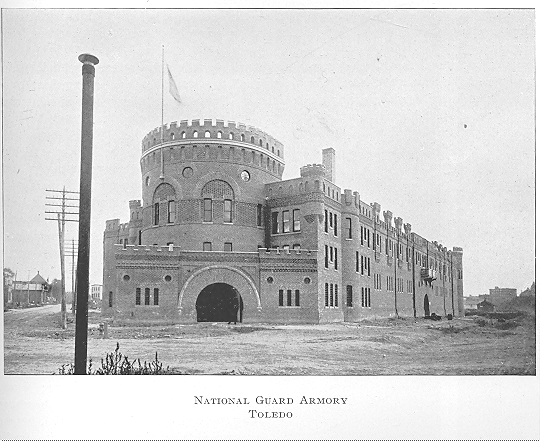
NATIONAL GUARD ARMORY
TOLEDO
they applied for admission into the Union. Bpt,Butue to his affiliation with the slave power,, President Pierce, in a message sent to Congress, in January, 1856, declared this action of the legal voters to open rebellion against the United States Government.
With the close of Pierce's term was born the Republican party. In 1855 an organization called the Knownothing party, intended to take the place of the Whig party, that became extinct with the death of Webster and Clay, lived but a short time, and the Republican party was organized, armed to match the machinations of the slave power. Unable the first year to elect its Presidential ticket, it became, however, a great opponent, in and out of
- 107 -
Congress, of that power. An irrepressible conflict approached, and the election by the Republican party, in 1860, of Abraham Lincoln, as President of the United States, was the spark that fired the gun whose report was heard all over the world. All the conditions were ripe for the war that soon broke out.
The State of Ohio, in 1860, had a population of 2,343,739. The existence of its territorial organization only began at the end of the last century, but it was already the third State in population and wealth in the Union. More than half of its area was under cultivation, and more than half of its adult males were farmers. So well was this most important body of the State's producers aided by the natural fertility of the soil that they furnished each year more than double the amount of food, animal and vegetable, that was needed for the support of the whole population of the State. Not less industrious and prosperous were the manufacturers of the State. The value of their products for 186o was over one hundred and twenty-two millions of dollars, an increase of 98 per cent in a single decade. And this State, with a population of less than two and a 'half millions, furnished an army of more than three hundred and ten thousand.
It was only natural that in the years before the war the popular feeling, at least in the southern part of the State, had been friendly toward the slave States. Along four hundred and thirty-six miles of her border lay slave States. From these many of her pioneers had come, many more traced with Kentuckians and Virginians their common lineage back to the eastern slope of the "Old Dominion." In time of war with the Indians and British, the most effective support to the exposed settlements of the infant States had come from the generous and fearless neighbors across the Ohio. In the long peace that followed the heartiest friendships and warmest social attachments naturally went out to those who had been proven in the hour of trial. North of the National road, which for many years was the Mason and Dixon line of Ohio's politics, different views prevailed and the people, tracing their ancestry to Puritan rather than Virginia stock, cherished different feelings ; but the southern half of the State, being more populous and more influential, long controlled the elections, and inspired the temper of the government and the State legislation. But gradually a change had begun. In the very heart of the conservative element of the State, one of the foremost lawyers of Cincinnati, Mr. Chase, kept up an anti-slavery agitation. He had found a few likeminded with himself, and society and the church combined to frown him down. Still, so singleminded and sincere was he, that, though the most ambitious of men, he resolutely faced the popular clamor, closed his eyes to all hope of political advancement, and daily labored at the task of resisting the pretentions of slavery, giving legal protection to the friendless and hapless negroes, and diffusing an abolition sentiment among the conservative men of the border, and the influen-

OPERA HOUSE BUILDING
PORTSMOUTH, O.
- 108 -
tial classes of the great city of the State, whose prosperity was supposed to depend upon her intimate relations and immense trade with the slave-holding regions contiguous to her. Under his leadership a new element sprang up in Ohio politics that made itself felt in the Presidential and State elections, and finally succeeded, as before mentioned, in sending its abolition leader to the United States Senate, and, later on, in electing him to the office of the Chief Executive of the State. Whether it was through a far-seeing anticipation of what was to grow out of this anti-slavery struggle, or whether it was only a result of the sagacious forecast which in most things distinguished his administration, Governor Chase early began to attempt an effective organization of the militia, against which popular prejudice was almost unsurmountable. Governor Chase at once essayed the formation of similarly uniformed and equipped militia companies at all leading points throughout the State, with a provisional organization into regiments and brigades. At first the popular ridicule only was excited, but by and by attention to the subject was slowly aroused. Some legislative support was secured, a new arsenal was established, an issue of new arms was obtained from the General Government, and an appropriation was at last made to a military peace establishment, and before going out of office Governor Chase had the satisfaction of reviewing, at Dayton, nearly thirty companies assembled from different parts of the State—every one of which was soon to participate in the war then so near and so little anticipated. His successor continued a policy thus inaugurated. Though comparatively little was accomplished, the organization. of Ohio militia was far superior to that existing in any of the States to the westward. Thus, materially prosperous and politically progressive, yet with much of the leaven of her ancient conservatism still lingering, and with the closest affiliation of friendship and trade to the slave-holding States of the Ohio and Mississippi Valley, but with the germs of a preparation for hostilities, and such a nucleus of militia as might serve to protect the border from immediate ravages, Ohio entered upon the year that was to witness the paralysis of her industry and trade, the sundering of her old friendships, her political revolution and the devotion of her entire energy to the business of war.
Ohio was wild with the excitement of the news of the bombardment of Fort Sumter, the surrender, and the call of the President to protect the capital from the danger of sudden capture by the secessionists. On the 15th of April President Lincoln issued his call to arms, and before forty-eight hours expired the First Ohio Volunteer Regiments were on the way to Washington.
On the 16th the feeling in Columbus had reached fever heat. Troops were arriving from all parts of the State, the telegraphs and mails were burdened with exhortations to the Legislature to grant money and men to any extent. On the following day the Senators of

SOLDIERS' MONUMENT, GREENLAWN CEMETERY
PORTSMOUTH, OHIO
- 109 -
Ohio, as a last effort, passed the Corwin constitutional amendment, providing "that hereafter no amendment or other change in the power of Government should be permitted,whereby the National authorities should be enabled to interfere with slavery within the present limits." This was the last effort at conciliation. Already, on the 16th of April, within less than twenty-four hours after the President's can- for troops had been received, the Senate had passed a bill, appropriating one million of dollars for placing the State on a war footing, and
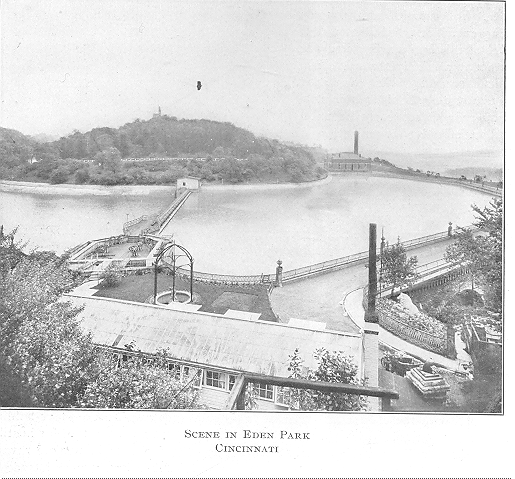
SCENE IN EDEN PARK
CINCINNATI
for assisting the General Government in meeting the shock of the rebellion. The debate which preceded the rapid passage of this bill illustrated the melting away of party lines under the white heat of patriotism. In the House, however, party oppositron disappeared more slowly and the bill went over to the third day from the date of its introduction, when it was finaly passed by an unanimous vote. In the meantime the Senate had passed a bill defining and providing punishment for the crime of treason against the State of Ohio. It declared any resident of the State who gave aid and comfort to the enemies of the United States guilty of treason against the State, to be punished 'by imprisonment in the penitentiary at hard labor for life. With the passage of these bills all the semblance of party opposition
- 110 -
to necessary war measures disappeared from the proceedings of the Legislature. A bill passed exempting the property of volunteers from execution for debt during their service, and, as within a few days it became evident that far more troops were pressing for acceptance than were needed to fill the President's call for thirteen regiments, the Legislature acceded to the sagacious suggestion of the Governor that they should be retained for the service of the State. Ten additional regiments were accepted. The bill further provided five hundred thousand dollars for their payment, and a million and a half more to be used in case of invasion of the State, or the appearance of invasion. In concert with the Governor the war legislation was completed, and when, within a month after the first note of alarm from Washington the General Assembly adjourned, the State of Ohio was on a war footing.
Before the bombardment of Fort Sumter had ended twenty full companies were offered to Governor Dennison for immediate service. The different militia companies of the State —the Guthrie Grays, the Cleveland Grays, the Columbus Videttes, the Light Guards of Dayton, the Rover Guards, etc.—held meetings and unanimously voted to place themselves at the immediate disposal of the Government. Chillicothe, Portsmouth, Circleville, Xenia, Canton, Lebanon, Lancaster fell in line and the larger cities of the State, Cincinnati, Cleveland, Dayton, counted their offers by the thousands. The enthusiasm of the people of Ohio for the sacred cause knew no bounds, and but a single day was required to raise the first two infantry regiments, in answer to the President's call. On the 16th of April they arrived, in separate companies, at Columbus, on their way to the capital of the country. The first three companies to report for duty were the Lancaster Guards, the Dayton Light Guards and the Montgomery Guards. The First and the Second Ohio Volunteer Infantry Regiments were made up of the following well - known militia organizations : First Ohio—Company A, Lancaster Guards; Company B, Dayton Lafayette Guards ; Company C, Dayton Light Guards ; Company D, Montgomery Guards ; Company E, Cleveland Grays ; Company F, Cleveland Hibernian Guards ; Company G, Portsmouth Guards,, Company H, Zanesville Guards ; Company I, Mansfield Guards Company K, Hamilton Jackson Guards. Second Ohio—Company A, Cincinnati River Guards ; Company B, Columbus Videttes ; Company C, Columbus Fencibles ; Company D, Cincinnati Zouave Guards : Company E, Cincinnati Lafayette Guards ; Company F, Springfield Zouaves ; Company G, Pickaway Company ; Company H, Steubenville Company ; Company I, Covington (Miami County) Blues, and Company K, Pickaway Company.
Captain George B. McClellan, an officer of the Ohio and Mississippi Railroad, a former West Pointer and offrcer in the regular army, was appointed Major General of the Ohio militia. At first all the troops were mustered in for ninety days, as the opinion prevailed that the rebellion would soon be suppressed, but soon came news that three-years' troops were to be called out, and that their Generals were to be appointed by the President. Immediately
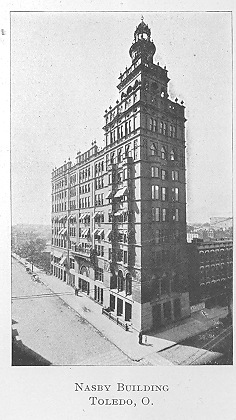
NASBY BUILDING
TOLEDO, O.
- 111 -
Governor Dennison determined to secure, if possible, the three years' appointment for his new Major General. On the 11th of May, he telegraphed to Secretary Chase : "Can McClellan get a commission for three years at once, so as to make him rank over all others, and make sure of his holding the chief command here? Ohio must lead throughout the war."
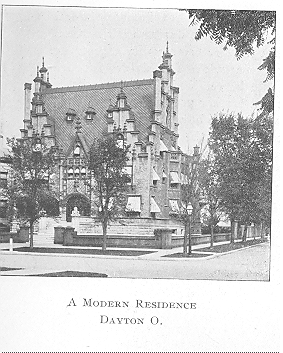
A MODERN RESIDENCE
DAYTON, O.
Three days later, while the Governor was in Cincinnati to look after the requirements of the southern border, he received the following telegram from Mr. Chase : "We have today had McClellan appointed a Major General in the regular army." Soon after this the Illinois troops and all others in the Mississippi Valley were united under the Ohio Major General.
The first note of war from the East threw Cincinnati into a spasm of alarm. Her great warehouses, her factories and machine shops, her rich moneyed institutions were all a tempting prize to the Confederates, to whom Kentucky was believed to be drifting. Should Kentucky go, only the Ohio River would remain between the great and rich city and the needy enemy, and there were absolutely no provisions for defense. The first alarm expended itself in the purchase of huge Columbiads, with which it was probably intended that Walnut Hills should be fortified, and from the first day that the war was open, the people of Cincinnati were as vehement in their determination that it should be relentlessly prosecuted to victory as the people of Boston. They immediately began the organization of home guards, armed and drilled vigorously, took oaths to serve the Government whenever called upon and devoted themselves to the suppression of any contraband trade with the Southern States. The steamboats were watched ; the railroad depots were searched, and wherever a suspicious box or bale was discovered, it was ordered back into the warehouses. After a time the General Government undertook to prevent any shipment into Kentucky, which had officially refused to furnish troops at the President's call and had declared herself neutral. A system of shipment permits was established, under the supervision of the collector of the port, and passengers on the ferry boats into Covington were even searched to see if they were carrying pistols or other contraband of war.
When the response of the Governor of Kentucky to the call of the President for volunteers—"I say emphatically that Kentucky will furnish no troops for the wicked purpose of subduing her sister Southern States"—was made public, Governor Dennison immediately telegraphed to the War Department : "If Kentucky will not fill her quota, Ohio will fill it for her !" Proud words that were more than kept. In two days two regiments were dispatched. In a week the quota of the State was more than full. Within ten days so many companies had been accepted that the State was forced to take ten extra regiments into her own pay. Before two weeks had elapsed more companies had been offered than would have filled the quota of Ohio, the quota of Kentucky and half the quota of Virginia. Sixteen days after the President's call Adjutant-General Carrington announced that the offers of troops from Ohio were sufficient to fill the full quota of seventy-five thousand men allotted to the entire country.
- 112 -
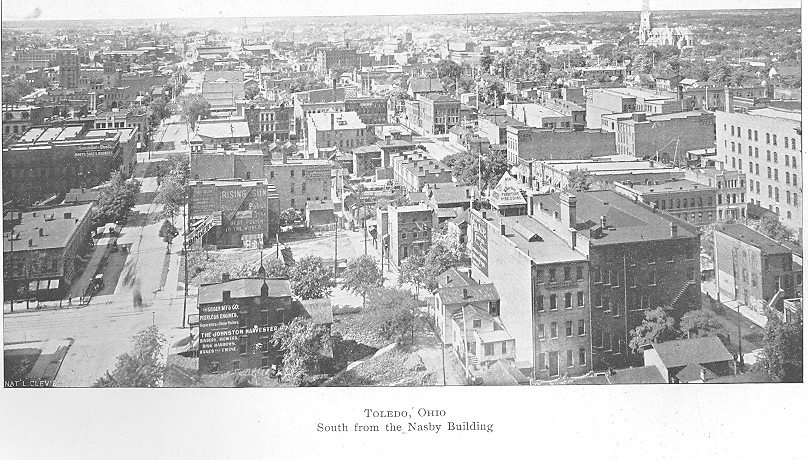
At the close of the first year of the war Ohio had forty-six regiments of infantry, four of
cavalry, and twelve batteries of artillery in the field, with twenty-two more regiments of
infantry and four of cavalry full, or nearly full, and thirteen in process of organization. In
all, the State then had in the three years' service 77,844 men, besides the 22,38o men furnished at the first call of the President for three months. Camps Dennison and Chase,
the one near Cincinnati, the other near Columbus, were controlled 'by the United States
authorities. On Governor Dennison fell the selection and management of other camps
throughout the State, of which the following are the principal ones established during
his administration : Camp Jackson, Columbus ; Camp Harrison, near Cincinnati ; Camp
Taylor, Cleveland ; Camp Goddard, Zanesville ; Camp Anderson, Lancaster ; Camp Putnam,
Marietta ; Camp Wool, Athens ; Camp Jefferson, Bellaire ; Camp Scott, Portland.
Until the United States understood the task of subsisting and supplying soldiers as soon as they were recruited, the troops were supplied by the State Quartermaster. Of the magnitude of the other interests entrusted to this officer during Governor Dennison's administration some idea may be formed from the following: Eleven thousand and nine hundred rifles were purchased on State account for the use of infantry ; one thousand, eight hundred and eighty-five carbines and revolvers for cavalry ; and forty-one six-pounder bronze field guns. A laboratory was established at Columbus for the supply of ammunition, which the United States arsenals were at first unable to furnish. From this laboratory two million, five hundred and five thousand, seven hundred and eighty musket and pistol cartridges were supplied, with sixteen thousand, five hundred and thirty-seven cartridges; fixed shot, canister and spherical cases for artillery. In the absence of a sufficient supply of rifles the old muskets were rifled, Miles Greenwood, of Cincinnati, taking the contract. The "Greenwood rifle" thus manufactured became quite popular, being considered by the troops the equal of the Enfield in precision and range, and more destructive, inasmuch as it carried a heavier weight of metal. During Dennison's administration twenty-five thousand, three hundred and twenty-four of these smooth-bore muskets were thus changed, at a cost of one dollar and twenty-five cents per gun. The State had under its control, at the outbreak of the war, thirty-three smooth - bore six - pounders. Twenty - seven of these were likewise rifled and made equal to the best rifled guns. Twelve additional batteries were contracted for, the guns for which Miles Greenwood had already begun casting. In the November election of 1861, David

BUILDING GUN BOATS ON THE OHIO RIVER
DURING THE CIVIL WAR
- 115 -
Tod, himself a Democrat, was elected Governor on the Republican ticket by 55,000 majority over Hugh J. Jewett, the nominee of the anti-war or regular Democratic party of the State. The Legislature was overwhelmingly Union Republican. In September, 1862, Cincinnati got a taste of actual warfare, when the "siege of Cincinnati" occurred. Two months previous, Cincinnati had been in a state of excitement on account of the invasion of John Morgan's Kentucky cavalry in the northern part of Kentucky, but this was only a forerunner for greater events.
Vague rumors of a new and more dangerous invasion began to be whispered, and at large, while Bragg and Buell warily watched each the other's maneuvres, Kirby Smith, who had been posted at Knoxville, broke camp and marched straight for the heart of Kentucky with twelve thousand men and thirty or forty pieces of artillery. Through Big Creek and Roger's Gaps, Kirby Smith moved without molestation, passed the National forces at Cumberland Gap without waiting to attempt a reduction of the place, and resolutely pushed
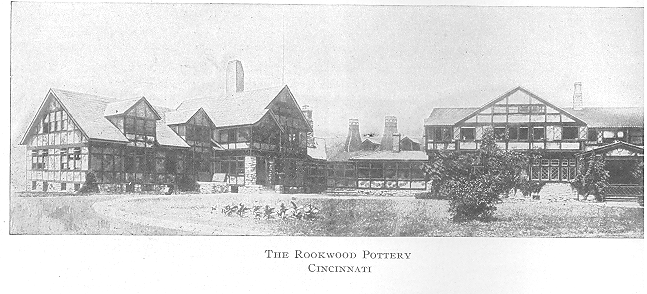
THE ROOKWOOD POTTERY
CINCINNATI
on into Kentucky unopposed, until within fifteen miles of Richmond and less than three times that distance from Lexington itself, when he fell upon a Kentucky regiment of cavalry under Colonel Metcalf and scattered it in a single charge. The routed cavalrymen bore back to Richmond and Lexington the first authentic news of the Rebel advance. With the first rumors of danger, Indiana and Ohio had both made strenuous exertions to throw forward the new levies, and Indiana in particular had hastily put into the field in Kentucky a large number of raw troops, fresh from the camps at which they had been recruited. These troops were hastily pushed forward in utter ignorance of the strength of the enemy, and apparently without any well defined plans, and as the victorious invaders came up towards Richmond, they found this force opposing them. Smith seems scarcely to have halted even to concentrate his command, but, precipitating the advance of his column upon the raw line that confronted him, scattered it at a charge. Two more attempts were made to check the advance of Smith, the last time almost in the suburbs of Richmond, but the
- 116 -
undisciplined and ill-handled troops were no match for their enthusiastic assailants, and when they were this time driven back, the rout became complete. The cavalry fell upon the disorderly retreating Union soldiers ; whole regiments were captured, and instantly paroled. Those that escaped fled to fields and by-ways, and soon poured into Lexington with the story of the disaster. On the 1st of September, General Kirby Smith entered Lexington, which city had been vacated by the Union troops. Two days later he dispatched Heath with five or six thousand men against Covington, Kentucky, and Cincinnati, Ohio. The next day he was joined by John Morgan, who had moved through Glasgow and Danville ; and the overjoyed people of Lexington thronged the streets and shouted from every door and window their welcome to the invaders. News of the disaster at Richmond was not received in Cincinnati until a late hour Saturday night, the 30th of August. It produced great excitement, but the full extent of the consequences of that defeat was not realized. There were soldiers in plenty, it was argued, to drive back the invaders, and only a few experienced officers were needed. Monday afternoon rumors became current that the troops were in no condition to make any sufficient opposition —that Lexington and Frankfort might have to be abandoned—but all thought that in any event there were plenty of troops between the invaders and themselves. By dusk it was known that, instead of falling back on Cincinnati, the
troops were retreating through Frank-
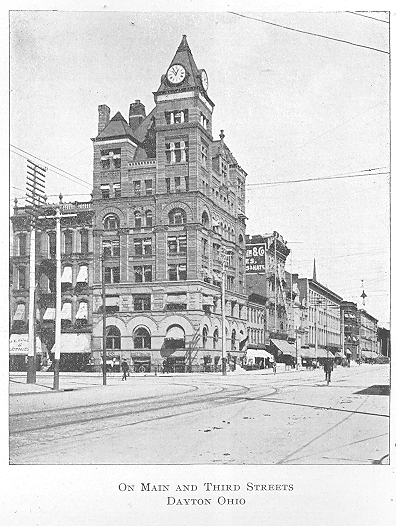
ON MAIN AND THIRD STREETS
DAYTON OHIO
fort to Louisville—that between Kirby Smith's regiments, flushed with victory, and the banks and warehouses of the Queen City, stood no obstacle more formidable than a few unmanned siege guns back of Covington, and the easily crossed Ohio river. But the city of Cincinnati at once took steps for an effective defense. The local Council was convened in special session and the credit and faith of the city were pledged for all expenses necessary for the public defense, and the Mayor was authorized and directed to order the suspension of business, and to call the citizens to arms. The military department of that time was commanded by General Horatio C. Wright. The City Council and the Mayor put all the resources of the city at his command. He responded to the situation by sending from the front General Lew Wallace, who arrived on the 1st of September, at nine o'clock in the evening. The Mayors of Cincinnati, Covington and Newport waited upon him at the Burnet House soon after his arrival. The three cities named were placed at his disposal,
- 117 -
and all were willing to obey his orders and uphold his demands. Before 2 o'clock of that night, a proclamation of martial law was prepared by him, which appeared in the newspapers of the next morning. In that proclamation the people were warned that an active and powerful enemy threatened them with all the consequences of war ; announced that the cities must be defended, and that their inhabitants must at once engage in the work; that there should be no distinction of classes, and no exemption from any duty while the danger was imminent ; that at nine o'clock the next morning every business house in the three cities must be closed, and that citizens must an hour later assemble in specified places ready for orders ; that this labor ought to be a labor of love, but that anyhow it must be done. Martial law was proclaimed in Cincinnati, Covington and Newport, and it was ordered that it should be enforced by the police until soldiers should arrive. Even the schools were closed, and the ferry-boats were forbidden to ply after a certain hour. The order was indeed a sweeping conscription, and an absolute prohibition of all kinds of private pursuits. It soon appeared that even in such great danger the order had been too comprehensive and inclusive. It was soon afterwards modified so as to allow the schools to proceed with their work, drug stores and bakeries to conduct their usual business, physicians to visit their patients, and banks to open from one to two o'clock daily. This order, instead of producing complaints and ill humor, as might have been expected, on the contrary was received with the greatest satisfaction. Every citizen beamed, upon his neighbor, as if there had been a proclamation of a great festival. The citizens not only perceived that the way to avoid threatened danger was to meet it, but they seemed to take pleasure in the prospect of defending their homes by force of arms.
Governor Tod hurried down from Columbus, and as soon as the situation was fully understood issued telegraphic orders to all available enlisted men to be sent to Cincinnati, and for a full supply of arms and ammunition. He issued a warning to all the border counties to organize for their defense. In response to numerous offers of assistance from neighboring counties he announced that all bodies of men who were armed would be received ; that they must repair at once to Cincinnati, and report to General Lew Wallace, who would complete their organization. None but armed men were to be received, and all the railroad companies were notified to transport them at the expense of the State. Exception was made of armed men residing in the river counties, who were directed to remain for the protection of their homes. These orders and proclamations were issued by Governor Tod on the 2d' of September. Next morning the first companies from the rural parts of the State, who have passed into history as the "Squirrel Hunters," began to appear in Cincinnati. They were a motley but enthusiastic assemblage of people. Without uniforms, practice in marching, ignorant of the duties of a soldier, possessing nothing but their guns and courage, they had hurried to the scene of threatened war. At that time there was no bridge across the Ohio river between Cincinnati and the cities on the Kentucky side of the Ohio, but rapid and certain communication between the States, menaced by this invasion, was an imperative

YACHTS ON ROCKY RIVER
CLEVELAND
- 118 -
necessity. As soon as it was known that Cincinnati must prepare for her own defense, a pontoon bridge of novel construction was laid almost in a night. Coal barges were placed side by side, parallel with the current, and anchored firmly in position. On top of these timbers were laid from shore to shore, on which the bridge planks rested, wide enough for four wagons abreast. It served every purpose for which it was intended. For two days after the appearance of the first "Squirrel Hunters," they kept pouring along the streets from all the railroad depots, and moving across the huge pontoon bridge.
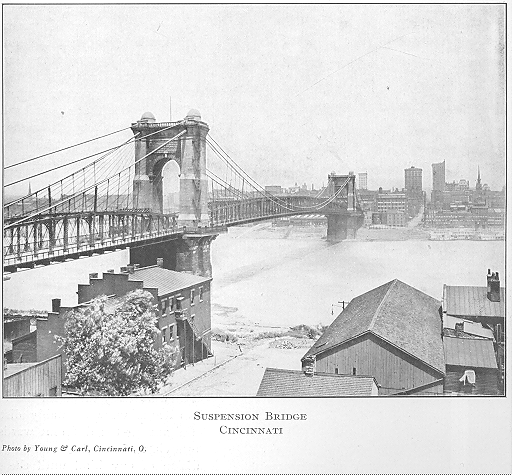
SUSPENSION BRIDGE
CINCINNATI
Photo by Young & Carl, Cincinnati. 0.
Every necessary preparation for their comfort had been made by the patriotic citizens. The Fifth Street Market House, which stood where the famous Tyler-Davidson Fountain later took its place, was turned into an eating establishment, where all were bountifully fed before crossing the river. In addition to the committees of citizens who were busy providing for the wants of the defenders of the city, the sanitary commission was energetic and liberal in the performance of all duties that came within its reach. At the front, as it was called—that is, the hills southward of Covington and Newport, details of citizens were kept busy with picks and spades under the direction of competent army engineers,
- 119 -

IN THE TALL BUILDINGS DISTRICT
CINCINNATI,
Photo by Young & Carl, Cincinnati, 0.
The enemy did not attack or even provoke constructing earthworks at every available point. Whatever may have been possible if a rapid movement had been made at first by the enemy, it became clear within three days that the cities could not be taken by a hurried assault. Time had been gained, and time assured final safety. The enemy had halted three days in Lexington, and, even when the movement on Cincinnati was made, it had not the energy and rapidity that betokens serious endeavor. On the 5th of September the Governor announced to the public that no more volunteers would be needed for the defense of Cincinnati, but he advised that all military organizations be kept up for possible future needs. At this time about fifteen thousand of the picturesque citizen soldiers had reached the city. On the following day General Wright, commanding the department, issued an order permitting resumption of all lawful business except the sale of liquors, until four o'clock of each day. After that hour all business houses were required to be closed, and the citizens were to respond to requisitions which were daily made for laborers, and these were equitably distributed among the different wards of the city.
The enemy did not attach or even provoke a collision of any kind until the l0th of September, when some forward movements were made, which indicated a purpose of assault. There were some trifling skirmishes, but no attack. The General commanding the department again appealed to the Governor, and the march of the "Squirrel Hunters" from the interior was resumed. On the 13th this movement was checked, and the volunteers returned to their homes. It was ascertained on the 12th of the month that the enemy had quietly departed. The advance of the army under General Buell from Nashville threatened Briggs' main army, so that he was compelled to concentrate his forces. The absolute relief of Cincinnati from threatened attack was now at last secured. On the 15th of September, General Wallace left the city. All restrictions upon business were removed and all apprehensions ceased.
- 120 -
The next year, 1863, Mr. Vallandigham, a leader of the Democratic anti-war party, began to influence public sentiment in Ohio by the eloquent and fearless presentation of his peace views, tending to the aid and comfort of those in arms against the Union, was seized, tried by court martial, and found guilty of disobedience of military orders, and sentenced to imprisonment during the time of the war. President Lincoln changed this sentence to transportation to his friends within the line of the Southern Confederacy. He reached Wilmington, North Carolina, on the 17th of June, where, taking a blockade runner, he finally reached Canada, and established himself at Windsor, opposite Detroit. From here he communicated with his friends in Ohio and awaited results.
The summer of 1863 was made further notable by the raid of General John Morgan through Ohio. While General Rosecrans with his army still lay inactive along Stone river,
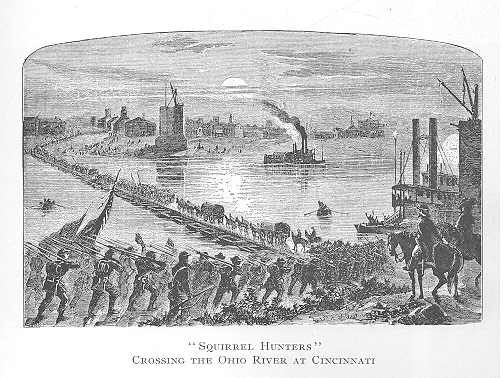
" SQUIRREL HUNTERS "
CROSSING THE OHIO RIVER AT CINCINNATI
John Morgan, the rebel guerilla chieftain, crossed the Cumberland river at Burkesville, on the 2d of July, and advanced directly toward the Ohio river. He had been ordered by General Bragg to make a raid through Kentucky, so as to break up communications between General Rosecrans and his base of operations. Disregarding the order of his commanding offrcer, he crossed the Ohio river below Louisville, and started upon his aimless march through the States of Indiana and Ohio. He was closely pressed by the National cavalry under command of General Hobson, so that his march partook more of the character of a flight than a military invasion. Navigation was suspended upon the Ohio river about Louisville, and all river craft put out of his reach. On Monday, the 13th of July, at one o'clock in the afternoon, he entered the State of Ohio at the town of Harrison. The military forces at hand were sufficient to intercept Morgan's forces, and with the assistance of the forces
- 121 -
of General Hobson, completely routed them. General Burnside has been criticized for his failure to end Morgan's career in Hamilton County, but that General purposely declined, as he expressed it, "to fight a battle in the suburbs of a great city." His opinion was, that to bring on a conflict would result in useless destruction of property and unnecessary suffering. So he purposely allowed the enemy to pass to the eastward, taking care that its march through the wealthy and populous regions about Cincinnati should be as harmless as possible, intending to capture and destroy Morgan's forces somewhere in the upper Ohio Valley. As soon as it was known that the enemy was pushing energetically toward Cincinnati, martial law was again proclaimed in that city, and hurried preparation was made to overtake the enemy. But before an organized body of men could be formed, the great raider had passed to the eastward, through the village of Glendale, and, continuing in an easterly direction, had reached the Little Miami by daylight on the morning of the 14th of July.

WOODLAWN CEMETERY
TOLEDO
There was no destruction of property in Hamilton County, except the burning of a bridge over the Great Miami river at New Baltimore. Morgan's flight continued eastward until he reached the Ohio river at Buffington Island, where he had intended crossing the river. The night was pitch-dark, the ford was guarded by a battery, and precious time was lost by the enforced delay. Gunboats arrived in time to make the crossing impossible, and Hob-son's cavalry had time to overtake the enemy they had pursued so far. About one-half of Morgan's force was captured, the rest escaping to continue their flight to the eastward, until they finally found it necessary to surrender.
The final capture of Morgan and the remnant of his force occurred at Salineville, Columbiana County, on the 26th of July. He had been thirteen days in crossing the State of Ohio, 'had plundered many small towns, had taken many horses by the way, had fought
- 122 -
several skirmishes, and so rapid had been his movements that, although fifty thousand men from all directions were hurrying to overthrow him, he was within a few miles of the eastern limits of the State when he was captured by soldiers who began their pursuit from Wheeling. The total loss to the citizens of Ohio by this raid was about a half million dollars. Morgan was confined at the penitentiary in Columbus, where he, with six companions, made their escape in the night of the 27th of November, 1863, by cutting through the stone floor of his cell with knives from the prison table, until they reached an air chamber below, from which they tunneled through the wall of the prison and by means of ropes made from their bed clothes scaled the outer wall. Hastening to the depot, Morgan and the other fugitives boarded a train of the Little Miami Railroad for Cincinnati, and when near that city jumped from the train, made their way to the Ohio river, which they crossed, and were soon within the Confederate lines. A year later Morgan was killed on a raid in an obscure little village of East Tennessee. After the Morgan raid the life of the war drifted away to the southward, so that Ohio was never again disturbed by the approach of a hostile force. The wasted armies of the rebellion were too remote to be a menace, and too feeble for diversions.
On the 17th of June, 1863, the Union Republican convention met at Columbus and nominated John Brough, an old line Democrat, for Governor — he being of great popularity and of such extraordinary executive ability, as well as oratorical powers, as to be thought more likely to carry the State than Mr. Tod, the then Governor of Ohio. The peace party nominated Mr. Clement Vallandigham. His banishment had aroused so much sympathy for him, the exiled "hero," that his followers nominated him for the office of Governor. During the summer of that year, as before mentioned, Mr. Vallandigham resided at Windsor, Canada, from where he directed his campaign. As the campaign drew towards its close, when the speeches had all been made, and the issues fairly laid before the people, and only a few hours remained
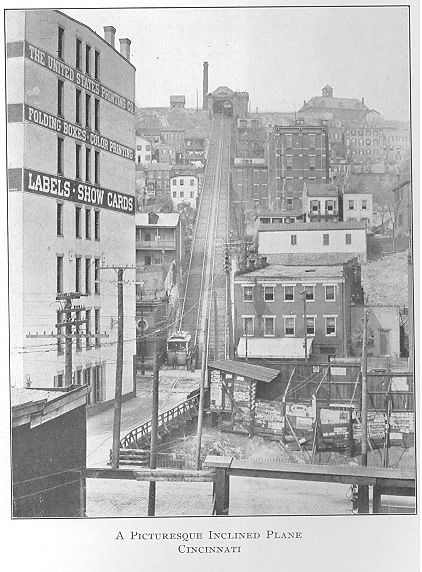
A PICTURESQUE INCLINED PLANE
CINCINNATI
- 123 -
before the depositing of the ballots, a feeling of deep solemnity pervaded the entire commonwealth. Everybody understood the grave importance of the coming election. The eyes of the whole nation were upon Ohio ; on the result of the coming election hung the death or salvation of the Union. If Ohio should prove recreant, all was lost. But Ohio was true—Ohio always is. John L, Brough was elected Governor by the unprecedented majority of 101,099 votes. Of this the home majority was 61,920 and the soldiers' majority 39,179. Out of 43,755 soldier votes, only 2,288 were given to Vallandigham. Of the citizens who remained at home, over 180,000 signified their preference for Vallandigham.

HOSPITAL BUILDING
TOLEDO, O.
Governor Brough, the last of Ohio's war Governors, was the man for the most trying crisis. From the opposition to the war, President Lincoln was afraid that another draft upon the ,people would result in failure, and more troops were imperative. Seeing this, Governor Brough called a convention of the Governors of Indiana, Illinois; Wisconsin and Iowa, which, with himself representing Ohio, met, and on the 21st of April, 1864, notified President Lincoln that they could furnish him with 85,000 men for one hundred days; without a dollar of bounty or a single draft. These were citizen volunteers, largely men
- 124 -